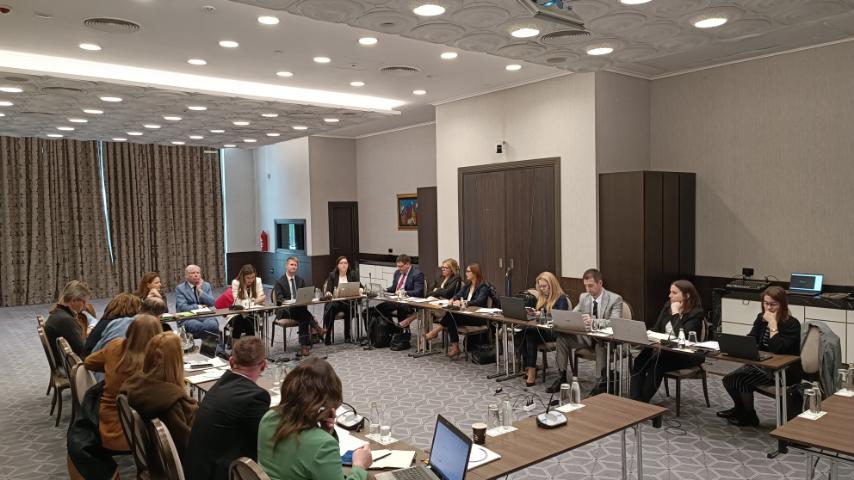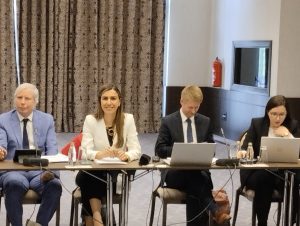More expedient, transparent, and more comprehensive CEFTA dispute settlement mechanism
Podgorica – A reliable dispute settlement mechanism is essential for the successful economic cooperation and increasing trade between the CEFTA Parties and their subsequent entry into the EU Single Market. Two-days negotiations on Additional Protocol 7 were held in Podgorica, making the progress in setting up the more efficient Dispute Settlement Mechanism (DSM).

The DSM implies a rule-based process for resolving disputes that may arise between two or more Parties engaged in trade. “In order to prevent a detrimental effect on trade and overall relations between the CEFTA Parties, trade barriers must be overcome and disputes resolved. Setting up a quick, transparent, adaptable, and economical dispute settlement mechanism is the goal of the continuing negotiations. Such system must be guided by rules, be independent, unbiased, and ultimately capable of guaranteeing protection and enforcement. The improved DSM is expected to significantly contribute to integration within CEFTA, through greater predictability.” stated Mr. Emir Djikic, Director of the CEFTA Secretariat.
Mr. David Hudson from the European Commission’s Directorate for Enlargement and Neighborhood Policy (DG NEAR) pointed out that “An effective dispute settlement mechanism gives traders and investors confidence in building business with new markets. This is why the work within CEFTA on an improved dispute settlement mechanism is so important for boosting trade in the Western Balkans. Progress is being made and we hope that an agreement can be reached by the end of the year”.
 Recognizing the importance of adoption of the effective CEFTA dispute settlement mechanism, Ms. Jovana Krunic, Acting Director General of the Directorate for International Trade and Economic Cooperation in the Ministry of Economic Development and Tourism of Montenegro emphasized that the finalization of the negotiation of the Additional Protocol 7 on Dispute Settlement is defined as one of the CEFTA Chairmanship Priorities 2023 and encouraged all CEFTA Parties to continue with the constructive approach in negotiations with a view of closing the remaining open issues and completing negotiations during this year and the Chairmanship of Montenegro. She underlined that well-functioning dispute settlement mechanism can achieve many benefits for a free trade agreement and its Parties. It can help prevent and resolve trade disputes in a timely and efficient manner, thereby reducing uncertainty and increasing predictability for businesses and investors. It can also promote compliance with the agreement’s rules and commitments, which in turn fosters a level playing field for all Parties.
Recognizing the importance of adoption of the effective CEFTA dispute settlement mechanism, Ms. Jovana Krunic, Acting Director General of the Directorate for International Trade and Economic Cooperation in the Ministry of Economic Development and Tourism of Montenegro emphasized that the finalization of the negotiation of the Additional Protocol 7 on Dispute Settlement is defined as one of the CEFTA Chairmanship Priorities 2023 and encouraged all CEFTA Parties to continue with the constructive approach in negotiations with a view of closing the remaining open issues and completing negotiations during this year and the Chairmanship of Montenegro. She underlined that well-functioning dispute settlement mechanism can achieve many benefits for a free trade agreement and its Parties. It can help prevent and resolve trade disputes in a timely and efficient manner, thereby reducing uncertainty and increasing predictability for businesses and investors. It can also promote compliance with the agreement’s rules and commitments, which in turn fosters a level playing field for all Parties.
Negotiations on CEFTA Additional Protocol 7, were initiated in 2020, and are inspired on the WTO system and the EU model. The DSM encompasses consultation or negotiation, mediation, and arbitration to facilitate a quick and simple resolution between the disputing Parties. Additional Protocol 7 will regulate the mediation procedures, consultation rules, dispute settlement procedures, compliance procedures, compliance review, and Code of Conduct for members of the arbitration panel, in addition to general provisions regarding deadlines, costs, and logistics.
Negotiations on Additional Protocol 7 are supported by the UNCTAD project ‘Non-Tariff Measures monitoring and reporting, and support to the implementation of the CEFTA Dispute Settlement Mechanism’, funded by the European Commission. ‘The project provides legal assistance for negotiators so that they can achieve an agreement for a modern and effective mechanism. Other connected activities will support the implementation of the AP7 once adopted, and raise awareness among businesses. It will also support efforts for monitoring of NTM and transparency of trade related regulations’, said UNCTAD representative. ‘Trade conflicts arise naturally, and an effective dispute settlement also helps to prevent barriers and supports an extended, larger market for companies. We see CEFTA Parties generating business at a larger scale, smoothing bumps along the way with an effective mechanism for solving disputes’, added UNCTAD.
The current rules for dispute settlement have been prescribed in the CEFTA Agreement. The initial dispute settlement mechanism proved ineffective for the new reality and required serious reform due to its limited use, as the strengthening of economic cooperation led to increased trade flows and strengthened relations between the Parties.

